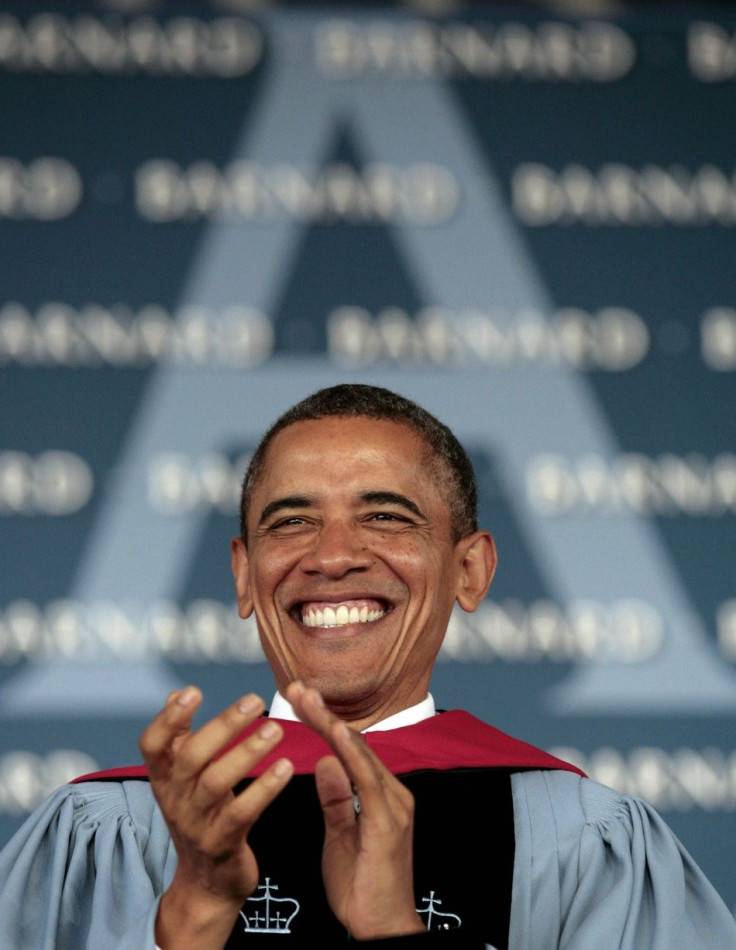Obama to Barnard Grads: 'As Tough As Things Are Today, I Think You Are Tougher'

President Barack Obama gave inspiring words of advice to Barnard graduates heading for the workforce in tough times, championing women's rights, and at the very end of his speech, alluding to his support of legalizing same sex marriage.
No matter whom you love or what God you worship, you can still pursue your own happiness. I will be with you every step of the way, the president told the 600 graduating students of Barnard College's class of 2012 in New York City Monday.
Speaking at the commencement of the most competitive all-women's college in the country -- on the same turf as his undergraduate alma mater, Columbia -- provided Obama with the opportunity to push his agenda on women's rights forward. Many also wondered if he would reiterate his stance on gay rights after becoming the first sitting president to announce that gay couples should be allowed to get married, although he only spoke of LGBT rights briefly at the end of his speech.
Women's issues, however, was the overarching political theme in Obama's advice to graduates. From the Lily Ledbetter Fair Pay Act to support of funding institutions like Planned Parenthood, equal pay and health care have become major talking points of the Democratic Party. Those issues were recently highlighted in a slide show made by the Obama 2012 called Life of Julia, in which his campaign showed how Obama's policy would help a woman in each stage of her life compared to policies under Mitt Romney.
Obama often invoked his daughters when describing his ambitions for women in the workforce and giving fatherly advice. He highlighted the progress that women have made in the workplace, and spoke of the difficulties of balancing family life and a career.
As a young woman you're going to grapple with unique challenges, like whether you're going to be able to earn equal pay for equal work; balance work with family; make your own choices about your health, he said.
Overall, Obama's tone was inspiring and optimistic. He encouraged the graduates not to underestimate the power of their example.
Don't just get involved. Fight for your seat at the table. Better yet, fight for a seat at the head of the table, he said.
He also mentioned his wife, First Lady Michelle, while encouraging women to fight stereotypes and go into male-dominated fields like tech and science -- but added there was nothing wrong with being both stylish and powerful.
Until there are women who tell her to ignore our pop culture obsession over beauty and fashion and focus instead on studying and inventing and competing and leading, she'll think those are the only things that girls are supposed to care about. Now, Michelle will say there's nothing wrong with caring about that a little bit, Obama said in his commencement speech.
A more difficult task for Obama, however, was inspiring a group of students who face a troubled economy. With half of recent graduates unemployed and underemployed, young voters have become a major focal point of both President Barack Obama's and Republican rival Mitt Romney's campaigns. Obama warned of pessimism and words of discouragement.
This recession has been more brutal, he said. The job losses are steeper, politics seems nastier, Congress is more gridlocked than ever ... My job today is to tell you not to believe it because as tough as things are today, I think you are tougher.
As Obama made his speech, the Republican National Committee sent out a press release slamming him for the troubled economy titled, Obama's Commencement Address Probably Won't Mention How His Policies Have Made The Job Market Tougher For College Grads.
In it was a link to an op-ed penned by Congresswoman Nan Hayworth, Republican of New York: I wonder if [Obama] will be honest about the dire economic future they [graduates] face. In this election year, the president's supporters have tried to use the concerns of women as political wedge issues.
© Copyright IBTimes 2024. All rights reserved.











